Artifacts of the Word: David as King
What is so important about King David?
There are many reasons why King David was and is an important and well-known man—not only biblically, but generally. These range from David being chosen of God to be king, to his slaying Goliath, to purchasing the site on which the Temple would be built…
Because of these things and more, there are few people, even beyond Jewish and Christian circles, who haven’t heard of or wouldn’t recognize the title, ‘King David.’
Some key reasons—including those mentioned above—are:
- David was the first king of Israel to be chosen wholly by God, not man.
- David was a worshiper in music and dance.
- David was beloved of the Lord, as his very name suggests. David’s name meaning, beloved.
- David is in the lineage of Jesus (see Matthew 1:6 and Luke 3:31).
- David wrote portions of Psalm 120-134—as would King’s Solomon and Hezekiah.
- David is mentioned in multiple books of the Old AND New Testament.
- David was given, by God, the skill to slay Goliath and thereby turn the battle against the Philistines.
- David, despite Saul’s attempts to kill him, did not slay Saul when given repeated opportunities. He knew not to touch God’s anointed.
- David recaptured the Ark of the Covenant.
- David conquered Jerusalem and made it the capital of Israel.
- David began to build up the city of Jerusalem.
- David fought his enemies until he could leave his successor—his son, Solomon—a kingdom of peace.
- David bought the land on which the Temple would be built.
- David’s legacy is literally written in stone; the ‘king of the House of David’ is mentioned in an Aramean stone tablet (See Image Below).
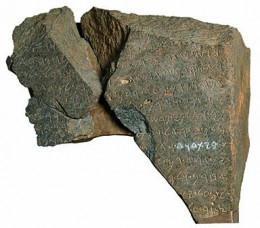
(Image Credit: biblicalarchaeology.org. The Tel Dan or House of David inscription is a stone tablet commemorating the victory of an Aramean king over two southern neighbors: the ‘king of Israel’ and the ‘king of the House of David.’)
What did David do as king?
David effectively created the foundation of what Israel would be to this day—a country devoted to God, whose capital is Jerusalem, and is the apple of God’s eye!
“For thus says the Lord of hosts: ‘…he who touches you touches the apple of His eye.’” —Zechariah 2:8
While Israel as a country was important, the city of Jerusalem played a key role. Not only for God, but for David, who out of his 40 years as king only spent seven in Hebron; the remaining 33 spent in Jerusalem (see 1 Kings 2:11). In fact, had David conquered Jerusalem earlier he’d almost certainly have spent his entire reign in Jerusalem, for his move to Jerusalem upon her capture was swift…
Yet, it was only through God’s favor that David could take Zion for the Israelites in 1010 B.C., allowing God’s promises to be fulfilled and Jerusalem to become the capital city.
“And the king and his men went to Jerusalem against the Jebusites… who spoke to David, saying, ‘You shall not come in here…’ Nevertheless David took the stronghold of Zion (that is, the City of David).” —2 Samuel 5:6-7
Still, many of us don’t realize that before David conquered Jerusalem it was far from the city we see today. Jerusalem was a mere fraction of its current size, and it was not overly fertile or particularly grand. Yet, David expanded and improved Jerusalem, allowing her to flourish.
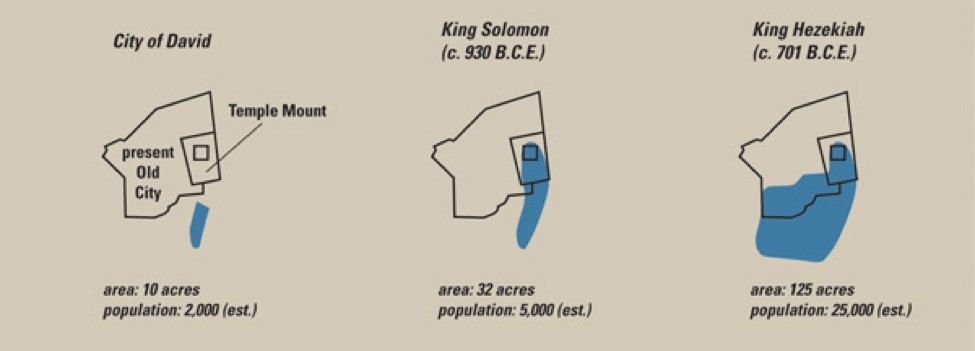
(Image Credit: The BAS Library. Areas in blue show the relative size of the walled city of Jerusalem during the reign of the three kings mentioned. Area size, population, and dates are not definitive, and many sources believe the areas to be larger.)
Even the Temple Mount was vastly different before David—indeed, even until the rule of his son, Solomon—for much of the site was merely a threshing floor, to thresh the wheat and barley harvests of a Jebusite man. Nonetheless, the site was chosen by God and purchased by David… but it would take an act of disobedience and another generation before it could become the Temple of God.
David’s disobedience and repentance:
It seems odd that the site for the Temple was purchased as an atonement for sin—a sin which involved God’s chosen, King David. It’s even odder when you consider that David loved the Lord… but even those who love God can disobey Him.
David ignored the fact that he was instructed not to take a census of his people, specifically of those men throughout his kingdom who could draw sword…
By taking the census, David placed his trust in HIS own power and might rather than in God’s. David wanted to prove what HE could do, not what God could.
David’s disobedience angered God, but it was not merely his actions—it was because David had lost sight of Him. He disregarded God and was given three options of atonement. With David’s choice, a plague was to come upon the people, yet God was merciful. God’s word was dispatched to David through the prophet Gad; to atone David was to purchase the threshing floor of a Jebusite man to use as a place to build an altar to the Lord (see 1 Chronicles 21:18-22 and 2 Samuel 24:18-19).
This was to be King David’s repentance.
David bought the land for 600 gold shekels, and for 50 silver shekels he bought the threshing floor and oxen for sacrifice. By doing this he put his trust in the Lord once more, removing the plague as God promised (see 1 Chronicles21:22 & 25 and 2 Samuel 24:24).
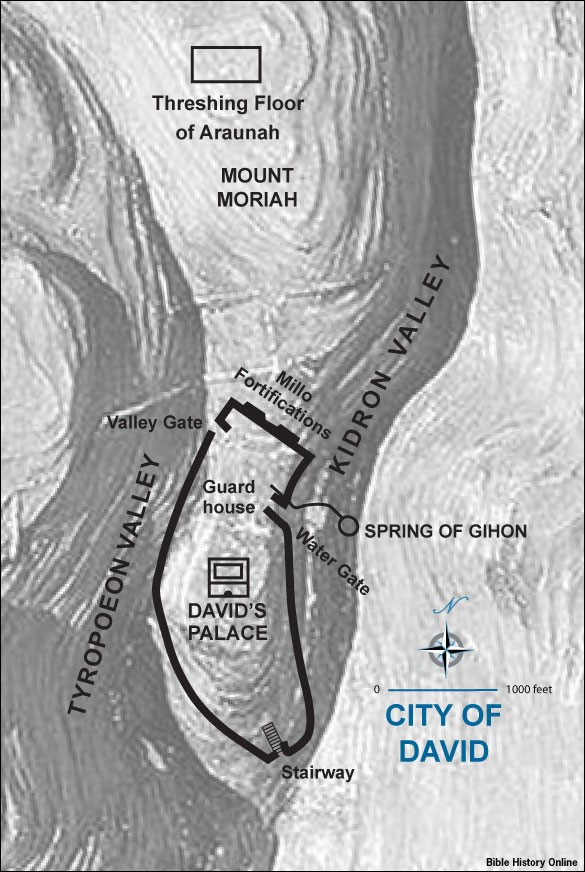
(Image Credit: Bible History Online. City of David and the threshing floor of the Jebusite man, later the site of the Temple.)
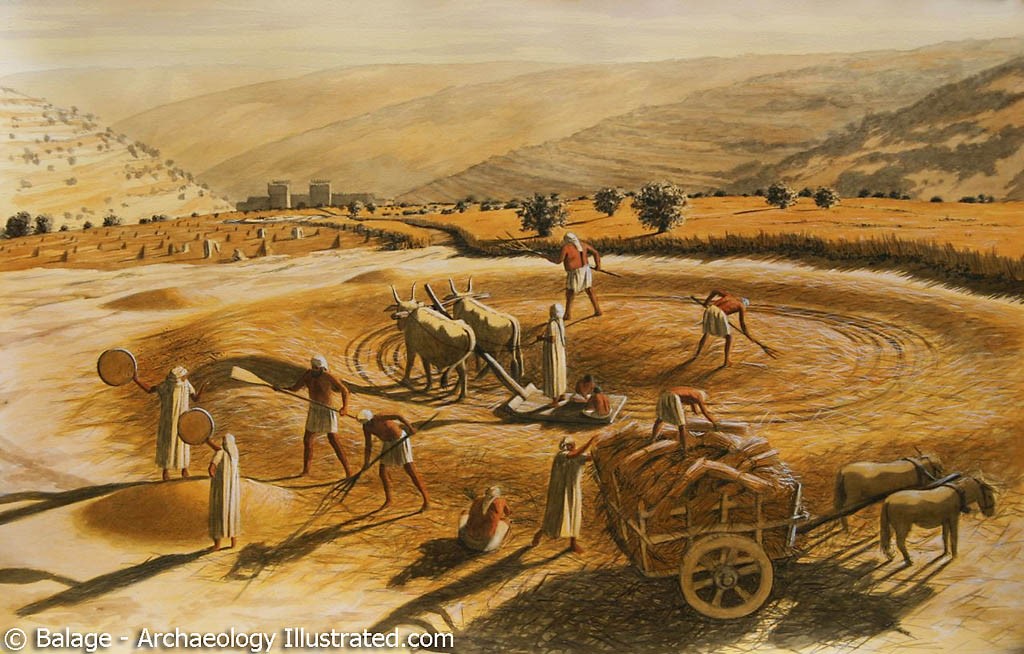
(Image Credit: Illustrated by Balage, ArchaeologyIllustrated.com. Threshing floor of Araunah/Ornan the Jebusite.)
Why wasn’t the Temple built by David? After all, wasn’t it David who purchased the site and recovered the Ark of the Covenant?
Yes, King David purchased the site for the Temple to be built, he even prepared plans and reclaimed the stolen Ark of the Covenant, but God chose David’s son Solomon to build His Temple.
“Now He said to me, ‘It is your son Solomon who shall build My house and My courts; for I have chosen him to be My son, and I will be his Father.’” —1 Chronicles 28:6
Yet, it was less David’s sin of taking the census and more the years of warring that disallowed David the honor of building the Temple. David simply had too much blood on his hands—first from his youth killing Goliath, then from his years serving Saul in battle, his subsequent years of warring in exile, and even his time as king when David fought for Israel. Most of all, it was likely from sending Bathsheba’s husband to his death in battle so he could have her. Therefore, while David remained chosen of God, God tasked the building of the Temple to David’s son, Solomon (see 1 Chronicles 28:2-6).
It is important to remember that while David may have made many mistakes before and after he was king, he was still anointed of God. Not only was he anointed of God, but David LOVED God—and God loved him! God and David enjoyed a relationship, not merely holy fear and forgiveness.
David played music for the Lord and danced before Him—not just when he was alone, but in public. David loved the Lord so much that he did not care what people might think of him. He wanted to do God’s will and while he didn’t always succeed, David always managed to return to the Father.
“Then David danced before the Lord with all his might…” —2 Samuel 6:14
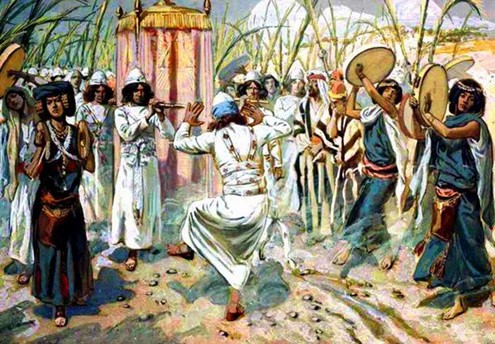
(David Dancing before the Ark, James Tissot [1836-1902])
There are many ways we can demonstrate this passion for the Lord. One is by singing and dancing as David did. Another is by preparing a place for God’s Temple within us, just as David did for the physical Temple. While still another is by taking care of the children of Israel as David did.
Today, via Curt Landry Ministries YOU can be God’s arms of love as YOU support Israel and her people by giving food and love to Israel’s Defense Force (IDF) soldiers, music to needy children, a home to young men and women without a place to safely begin their lives.
When we show the love of God to those who are forgotten or slip through the cracks of the system, we are answering the call of the Word, by doing unto the least of these.
We are bringing rays of God’s hope and love, firm in the knowledge that what we give shall be given unto us. That YOU will be blessed as much as they by opening your heart to give.
“Give, and it will be given to you: good measure, pressed down, shaken together, and running over will be put into your bosom. For with the same measure that you use, it will be measured back…”
—Luke 6:38

Did you purchase your book but haven’t yet obtained your study guide? Click [HERE] to get yours today!